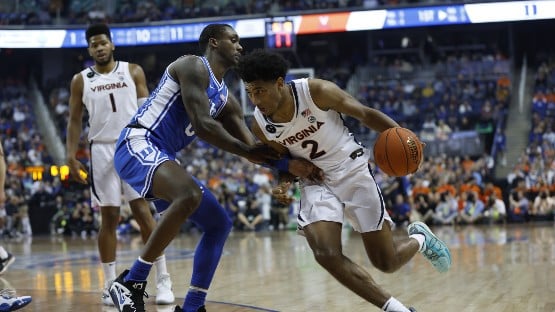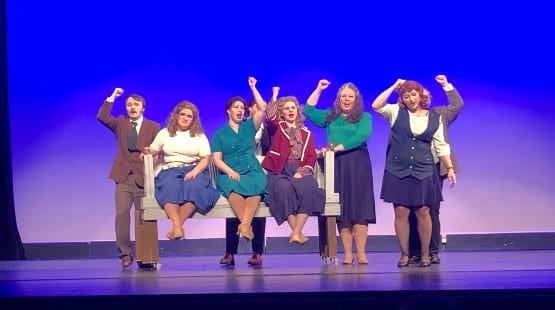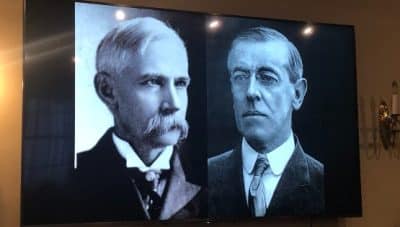
The NBA has released the list of players who have been invited to the G League Elite Camp, and Reece Beekman’s name isn’t among them.
This probably isn’t good news for our friend Beeks, a three-year Virginia starter and 2023 ACC Defensive Player of the Year, who put his name into the NBA Draft pool last month.
The test of the waters hasn’t seen Beekman’s status move much from where it was toward the end of the 2022-2023 UVA season, when the consensus was that he was a borderline late second-round pick who is at best 50/50 to go undrafted.
Assessing Beekman’s game
His defense is already NBA-ready.
Per SynergySports, Beekman allowed opposing players 0.700 points per possession on 32.8 percent shooting and a 40.0 percent effective field-goal rate, ranking him among the top 10 percent of players in D1 who defended on at least 250 possessions in 2022-2023.
Flip side, Beekman’s offensive game is nowhere near NBA-ready.
First, there’s the counting numbers, which are pedestrian – 9.5 points per game, 40.5 percent shooting, 42.8 percent on two-points shots and 35.1 percent from three.
He did average 5.3 assists per game, with a 3.3-to-1 assist-to-turnover ratio.
Deep diving into his offensive profile, though, there are obvious issues.
Beekman is surprisingly average in transition (1.021 PPS, 53.1% FG, 54.7% EFG), and actually below average finishing at the rim (1.030 PPS, 51.3% FG and EFG).
These are not good numbers for a guy who is just an average jump shooter (0.820 PPS, 30.4% FG, 41.2% EFG), who only shot 30.6 percent on unguarded jumpers (11-of-36) in 2022-2023.
And then, there’s the intangibles.
It’s a fair criticism to note that Beekman may not have even been the best point guard on the Virginia roster the past three years, and the guy that he clearly couldn’t supplant as the leader of the team, Kihei Clark, is not NBA material.
Clark, for one, had the better counting numbers – 10.7 points per game, 5.4 assists per game, 39.9 percent shooting, 42.9 percent on twos, 35.2 percent on threes.
And then, deep diving into the offensive side, Clark was much better in transition (1.143 PPS, 56.0% FG, 66.0% EFG), on jumpers (0.950 PPS, 34.7% FG, 47.6% EFG) and was comparable at the rim (0.950 PPS, 47.3% FG and EFG).
Beekman does rate noticeably better than Clark on the defensive end, where Clark gets a “below average” rating from SynergySports, allowing 0.962 PPP on 44.1 percent shooting and a 53.4 effective field-goal rate.
Still, no one would argue that, for good or bad, Virginia was Clark’s team when the two were on the floor together the past three years.
That Beekman was a willing second fiddle to Clark doesn’t speak well to how he would be expected to transition to the next level.
Thinking through Beekman in the NBA Draft
Beekman, because of his offensive limitations, is still very much a project.
Teams looking in the second half of the first round of the draft, most likely playoff teams because of their draft position, would be looking for a point guard who could be a candidate to be the #2 guy.
Beeks isn’t ready to be a #2 guy for a playoff team, and probably isn’t ready to be a #2 guy for a lottery team, which is why he’s not a top half of the second round guy right now, either.
A team looking at him late in the second round would be gambling that they could work with his offensive limitations, assuming that some time in the G League on a two-way deal could do him some good in that respect.
The thinking there would be, there does seem to be a switch that just needs to be flipped, given Beekman’s prodigious physical skill set.
It seems more likely that a team thinking of Beekman as a two-way deal guy would also gamble that he’d be around after the draft to sign as an undrafted free agent.
This scenario could work out for Beekman, because he’d be able to choose what he thinks is the best situation.
Bottom line, it’s hard to imagine Beekman, if he stays in the draft pool, not getting a job somewhere, at the least in the G League.
The risk of staying in the draft pool
First-round picks get guaranteed money for three years. Consider the case of Ty Jerome, a first-round pick in 2019, who ended up being cut loose by Oklahoma City when his fourth-year option came up last fall.
Jerome ended up signing a two-way deal with Golden State for the 2022-2023 season, meaning he earned the standard two-way salary of $508,891.
His first three years, with Phoenix and OKC, he was paid an average of $2.3 million per year.
Second-round picks get nothing guaranteed, and to illustrate what that means, look at the case of Kyle Guy, a second-round pick in 2019.
Guy spent his rookie year in the G League, at a salary of $79,568.
His three-year compensation, split between the G League and brief stints in the NBA, was $1,000,535, nearly $5 million less than Jerome got as a first-round pick.
I’m not able to find anything definitive on what Guy is making this season in Spain, but the typical salary range for U.S. players there is in the range of $250,000 to $500,000.
I’d assume that Guy may be on the lower end of that, given his apparent lack of better options in the NBA.
Beekman, thus, by staying in the draft pool, is looking at a salary range in his first year of between $40,000 (the G League minimum), the $508,891 that guys on two-way NBA deals make, and the $953,000 rookie minimum.
His three-year earnings potential, you’d have to assume, projects more or less like that of Guy, getting better (into the $2.5 million to $3 million range) if he’s able to work his way from a two-way deal in Year 1 to the league minimums for Years 2 and 3.
That’s a wide range of possibilities.
The risk of returning to UVA
The first and most obvious risk is, he gets hurt to the point that he never ends up playing professionally.
Aside from that, what are his goals with a return?
If it’s just to finally flip the switch on his offensive game, that arguably could happen in the Summer League, an NBA camp or the G League, and he’d be getting paid when it happened.
Flip side to that, if Beekman is able to raise his offensive game to approximate his level of play on the defensive end, he could improve his stock to the point that he’s a first-round pick in 2024, which brings with it the three years (at least) of guaranteed millions.
The best possible route to maximizing earnings for an NBA aspirant is to be a first-round pick.
Which isn’t to say that second-round picks (see: Brogdon, Malcolm; Harris, Joe) can’t end up making $20 million+ per year on their second deals; it’s just, there are many more Kyle Guys who don’t than there are Malcolm Brogdons and Joe Harrises who do.
What the decision for Beekman comes down to
Is he willing to gamble that he’s a first-round pick, and ready to grind for the next 10-12 months to get his game to where it needs to be to get his name called in the first round in June 2024?
Flip side, has he reached the peak of what he can do at the college level? Basically, can Tony Bennett and his staff flip the switch to get Beekman to realize his potential on the offensive end?
I think it could be argued that if that could have been done, it would have been done already.
Other thoughts: Beekman has one year of work to finish his UVA degree. How much of a priority is that for him long term?
So much to weigh.
I have to be honest: I don’t know what I’d do here.










